- Home
- Keith R. A. DeCandido
Four Walls Page 20
Four Walls Read online
Page 20
In the morning, they handcuffed him again, and then they shoved him into a van that had no AC, which sat in traffic for hours, taking him into Manhattan somewhere. Marty didn't really pay attention to where; he just wished he could wipe the sweat out of his eyes.
Finally, they brought him into a dank room and made him sit there. They took off the handcuffs, but then put his left hand in a cuff that was attached to the table. The only way he'd leave was with the table attached. Not that he wanted to-this room, at least, had AC. The sweat cooled on his head, and he started to feel almost human for the first time since he'd buzzed the cops into his building.
Marty had no idea how much time passed before Bonasera, that stupid bitch of a detective, and some other stupid bitch came in. The second bitch had been at the apartment as well, but Marty never got her name. She was kind of hot, actually.
Before they could say a word, Marty said what he'd been saying to anyone who'd listen since they showed up with the warrant. "I didn't do nothin'!"
Bonasera stared at him for a second. "How much do you know about computers, Marty?"
"Huh?" That wasn't the question he was expecting. "Uh, I mean-I dunno, is this a trick question?" Figuring he had nothing to lose, he looked at the other detective, the hot one, but she just stared at him so hard that he had to look away.
Bonasera smiled insincerely. "Not at all. See, the way computers work is that when files are created, they also create a pathway to that file. But that's not the interesting part. You see, when you delete a file, you don't actually remove the file from the computer. What you do is cut off the pathway to the file, so the computer can't see it. But the information? That's still there. Eventually, it'll get written over if the space is required for something else, but if it isn't? It's all still there."
Marty stared at Bonasera for a second, parsing what she had just said. Then his face fell and he felt a new sheen of sweat bead on his forehead, even with the AC. "You mean-?"
"That's right, Marty. We were able to retrieve the love letters you wrote to Maria Campagna, which perfectly matched the printouts that Maria's boyfriend gave us."
Marty's jaw dropped. He hadn't thought that he needed to do anything except erase the letters. Damn it!
"Too bad for you that Bobby gave them to us," Bonasera continued.
Shaking his head, Marty said, "That Neanderthal."
"Who's that?" the other detective asked.
"DelVecchio! The big dumb jock wasn't good enough for Maria!"
"So you tried to woo her away?" Bonasera asked.
"Exactly!" Marty let out a long breath. "Damn it, she deserved better than him, but she just wouldn't leave him. I actually cared about animals-DelVecchio used to, I swear to God, kick puppies when Maria wasn't looking. I saw him do it once! Really!"
The hot detective said, "So you killed her."
Forcing himself to remember that the love letters didn't actually prove anything, he said, "No. Why would I kill her? I loved her!"
Scowling at him, the hot detective-who didn't look so hot when she scowled like that, Marty thought-said, "You know how many killers sit in that chair after murdering people they love, Marty?"
"Well, I ain't one of them. I'm tellin' ya, I didn't kill her!"
"So the bruise on your face didn't come from her punching you, even though the size of her fist matches the size of the bruise?"
"That was the Great Dane-Rex." He hoped he sounded convincing.
"And then there's the blood on Maria's necklace."
Now panic suffused Marty. There was blood on her necklace? Jesus, how the hell did he miss that?
"The blood's yours, Marty-we checked it against your DNA. Maria kept that necklace sparkling, so the only way that blood could've gotten on it was if it happened right before she was killed. Say, when she punched you in the cheek, loosening a tooth enough for it to bleed some?"
Marty couldn't believe he missed that.
"And then there's the fingernail on your sweatshirt. The same sweatshirt that your coworkers said you were wearing the night Maria was killed. One of Maria's fingernails was missing when we examined her body, and the very same missing fingernail was lodged in your shirt."
Oh, Jesus. Jesus Jesus Jesus, he had no idea. He thought about doing laundry, but he always did laundry on Saturdays. If he broke his routine, that was a pattern cops looked for. Marty watched television; he knew how cops thought. If he washed the clothes, he'd look like a suspect, so he wouldn't wash them.
How was he supposed to know there was a fingernail in there?
"All right," he suddenly said, "fine, you got me." He threw up one hand-the other one, still handcuffed, he couldn't raise high enough. "Yeah, I killed her. I didn't want to, but when she hit me, I couldn't believe it!"
The hot detective said, "So you went into Belluso's at closing?"
"Yeah. That long-haired guy who takes karate-he was just leaving as I was locking the vet up. I saw she was alone, so I figured I'd take a shot, see if she'd leave that big dumb ape for a real man."
Marty could hear the disgust in Bonasera's voice when she said, "A real man who kills her when she gets uppity? That's what you mean, Marty?"
"No! Look, it wasn't supposed to happen like that, okay? It just got-" He sighed. "Out of hand, I guess."
"You guess?" Bonasera asked.
He found he had nothing to say, so he just looked down. "I guess I'm going to jail, huh?"
"Good guess." Bonasera got up from her chair and left the interrogation room.
The hot detective got up a second later. "They already read you your rights at the Fiftieth Precinct, so we'll just put you in holding until we can finish processing you. You'll be at Rikers by dinnertime, and you'll stay there until your trial, you sorry son of a bitch."
With that, she too left.
Marty hoped that prison would at least be air-conditioned.
22
JACK MULRONEY COULDN'T BELIEVE his bad luck.
Actually killing Barker wasn't anywhere near as bad as he thought it would be. He just walked up to the fence and shoved his improvised blade between the links when Barker was stupid enough to be standing too close. The bastard was leaning against the fence drinking from a bottle of water, sweat dripping down his face after his weightlifting exertions.
That got him sweaty. Not the box. If anything, that pissed Jack off more. Gave him even more reason to stab his sorry ass. He limped over to the fence and just did it.
What he hadn't expected was the blood. Christ, it was everywhere.
In fact, that had kept Jack frozen to the spot where he was standing for at least a couple of seconds, watching the blood just gush all over the entire weight yard, like a red version of those seltzer bottles in old comedy TV shows, just spritzing all over the place.
Fischer, though, he took charge. He made Jack drop the shiv and then all the other guys huddled around him. Nobody would say anything to the COs, and he'd be clear.
Even if he wasn't Barker would be dead. Twice, he showed Jack up-on the field and in the box. Three times if you counted him exerting himself in the weight yard, the bastard.
Of course, things didn't go according to plan after that. He figured there'd be the usual internal investigation. Russell didn't know nothing from nothing, so Jack didn't expect much there, but instead he called in the NYPD.
Jack hadn't expected the full-court press the case got. It was probably because of Washburne. Everybody in the prison, on both sides, was sucking his dick pretty regularly, so his dying probably got the cops' hackles up.
Just bad luck was all. If Washburne hadn't died, they probably never would have figured out that Jack killed Barker.
And nobody would've cared. Jack knew he wasn't anybody special, but Barker was even less than that. Just some drug runner from Brooklyn, same as fifty other drug runners from Brooklyn. Nobody would miss him.
And Jack killed him. He deserved it.
Now, though, Jack was in Rikers, and soon he'd be transfe
rred to a maximum-security facility. They hadn't told him which one yet. He didn't really care all that much. Sure, he'd be tried, and maybe he'd get the death penalty-but at least he showed Barker what for.
It was worth it just for that.
* * *
Stanton Gerrard hated going into the chief of detectives' office these days.
Ever since Mac Taylor had walked into that office and blackmailed Brigham Sinclair and Gerrard himself, Sinclair had been in a perpetually foul mood.
However, he'd been summoned to His Majesty's sanctum, and Gerrard wasn't stupid enough to turn down such a request. He'd put in his time on the streets and then some, and right now, his goal was to retire with as big a pension as he could scrape up-and also to stay as far off those streets as possible. Not that the job didn't need doing, but there were lots of better, younger police who could do that. Guys like Don Flack. Gerrard had always had a soft spot for Flack ever since the young detective came under Gerrard's command, and he knew that guys like him would keep things from getting out of hand on the pavement.
Gerrard, though, was too old for that. When he closed his eyes, he could still see the crazed eyes of that junkie on Forty-third Street who almost stabbed him. This was back in the late eighties, before Disney had taken over Times Square, and the area was a squalid cesspool of drug dealers, whores, and junkies.
That junkie had almost killed Gerrard. Instead, Gerrard shot him in the leg. He figured it would wound, but he hit a major artery, and the junkie bled out and died.
Whenever Gerrard found himself awash in the stupid politics of being one of the bosses, he remembered that junkie, remembered those eyes, remembered the drugged-out lunacy of the man as he waved his knife around-remembered the stomach-twisting fear he felt as he squeezed the trigger.
He'd done his duty. From that moment on, Gerrard was the good soldier. The same bosses he used to make fun of at the bar after the shift ended suddenly became his best friends. (Okay, he still made fun of them at the bar after the shift ended, but more quietly now.) After years of disdaining the sergeant's exam, he took it and placed high. Promotion suddenly became a desired goal instead of a dirty word.
If nothing else, he justified being a boss by saying that he used to be rank-and-file. At least he understood how they thought, and maybe he could be a better boss than the guys who used to make his life miserable.
On some days, he even believed that.
Today, though, he thought as he entered Sinclair's office, wasn't going to be one of those days.
As soon as he closed the door behind him, Sinclair exploded. "A memo! Can you believe this, Stan? The man sent me a memo. He couldn't even do me the favor of a phone call."
"Who sent a memo?" Gerrard asked, not unreasonably, since he didn't have the first clue what Sinclair was talking about.
"The commissioner!" Sinclair cried, holding up a sheet of paper.
"What about him?"
"I requested that Malik Washburne get a blue funeral."
"And he said no?"
"In a memo, Stan! The man gave the best years of his life to the department, and this is what he gets?" He held up the memo near his scowling face. "'After due consideration, I'm afraid I must decline your request to give the former Officer Washburne a departmental funeral. I believe it would be inappropriate to provide an honor guard for someone who was convicted of homicide and who died in prison custody.'" He slammed the paper down on his wooden desk.
Gently, Gerrard said, "Did you really expect anything different?"
"A different answer? Of course not. I owed it to the man to ask, but I'm not stupid, Stan. No way they fire twenty-one for a guy who killed two people while he was soused. But I expected to be told that. I don't even rate a phone call anymore, Stan."
"Maybe he just wanted to have it in writing."
"Then he calls, tells me that, and follows it up with a memo that says, 'As per our conversation, no honor guard.' Fine. Instead, I just get a brush-off." He pointed at Gerrard with an accusatory finger. "This is Taylor's fault."
Gerrard blinked. "I'm sorry?"
"The commissioner's pissed that Taylor got off. He wanted at least a reprimand-and I couldn't tell him why that happened." Sinclair shook his head and sat down at his desk. "Or he does know why, and he's pissed about that. Either way…"
Taking the guest chair opposite the chief, Gerrard said, "Look, Mac's not exactly at the top of my Christmas card list right now, but I don't think you can put this on him. He thought his back was to the wall, and he acted. And I don't think the big boss gives a rat's ass about some guy in the crime lab anyhow."
"He gives a rat's ass about Clay Dobson. That gave the department a black eye, and I cost him his handy scapegoat." Sinclair shook his head. "Keep an eye on Taylor, Stan. He needs to be either the absolute best cop in the history of the NYPD, or he needs to go in disgrace. It can't be anywhere between those two."
Gerrard left Sinclair's office more than a little confused. Did he actually just defend Mac Taylor? Will wonders never cease?
But he saw Sinclair's point. If Mac excelled, then Sinclair could point to that and say that it would've been bad for the department if he'd been punished. If Mac screwed up, then Sinclair could serve him up to the commissioner on a silver platter.
It was going to be an interesting next few weeks.
* * *
Dina Rosengaus missed the morning shift.
She had been applying for jobs elsewhere in the neighborhood. A Subway had opened up on Johnson Avenue with a HELP WANTED sign in the window, there were four supermarkets in the area that were always looking for cashiers, and she'd also filled out applications at the Staples on Broadway, some of the restaurants up on Riverdale Avenue, and the CVS on 235th Street.
But nobody had given her a job yet.
Of course, all the jobs asked if you had a criminal record, and she had to answer in the affirmative. She had been arrested, fingerprinted, the whole thing, but her parents' lawyer-a fellow Russian emigrй and husband to her father's cousin-was able to get her to plea to a lesser charge and pay a fine, which her father had paid. She hadn't even spent any time in a jail cell, though she did spend hours sitting at one police officer's desk with nothing to do except think.
Mostly she thought about Maria Campagna and her stupid necklace. If she hadn't felt the need to show it off all the time, maybe Dina wouldn't have taken it.
It wasn't like Dina killed her. And Jack hadn't either, for which Dina was grateful, as she liked Jack. No, it was that guy from across the street.
Dina had never liked him.
While her father had paid the fine, it was only on the condition that she pay him back. At that, he told her he'd wanted to let her rot in prison for the rest of her life, but her mother convinced him it was better to pay the fine.
"But you will pay me back, every penny!" he had bellowed in Russian.
School had been miserable. The summer-session classes were smaller, so it was harder for Dina to hide in the back of the class and hope nobody noticed that the girl who got arrested was there.
At first, it hadn't been that bad. People found out that she had been one of the ones who found the body, so that raised her in several people's estimation. They wanted to know what the body looked like, what it smelled like, what the police did.
But eventually, they found out that she had stolen from the body. Dina had no idea how they found out-she certainly didn't tell anyone. Then again, she didn't tell anyone that she had found the body, either. The information simply was there.
The same people who were morbidly but genuinely curious about the look of a corpse were now disgustedly querying why she would do such a thing, and wasn't it gross to touch it, and isn't that like necrophilia or something, and on and on and on and on.
And nobody would give her a job.
Which meant that she spent her mornings, not in Belluso's Bakery pouring coffee for commuters and people walking their dogs and parents taking their children to sch
ool, but sitting at home alone wondering why she'd thought taking Maria's necklace was a good idea.
Maybe she'd look for a job that wasn't in the Riverdale area. She could find something in Manhattan, take the 1 train to and from whatever job she got.
If she could get a job. Maybe being a criminal would keep her unemployed forever.
No, that was ridiculous. People got out of prison all the time, and they must have gotten jobs.
Dina would find something.
Then maybe she could stop thinking about Maria Campagna and her stupid necklace.
* * *
Malik Washburne's funeral was packed. Mac supposed he shouldn't have expected any less.
About half the people were NYPD, Mac among them. Many of them wore their dress blues, for all that it wasn't a departmental funeral, though Mac was not among those. He hadn't worn his blues for Aiden Burns's funeral last year, for much the same reason: when they died, neither Washburne nor Aiden were police officers anymore.
However, Mac was wearing a tie. The last time he'd worn one was, ironically, Aiden's funeral. That had been a modest affair. Aiden's family, of course, all attended, and several friends, none of whom Mac really knew, and her other ex-coworkers from the crime lab.
Aiden had been a good friend. Mac had nothing but praise for the excellent work Lindsay Monroe had been doing the past two years, but often Mac found himself missing Aiden's fiery passion, smart-ass remarks and dedication to justice. True, that dedication had led to Mac having to fire her, and eventually to her death, but at least in death Aiden was able to lead Mac and the others to her killer.

 Alien
Alien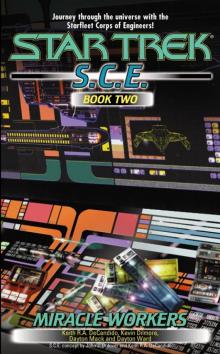 Miracle Workers
Miracle Workers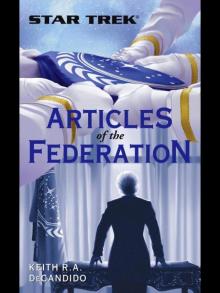 Articles of the Federation
Articles of the Federation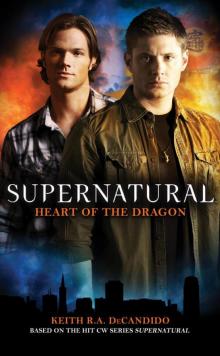 Supernatural Heart of the Dragon
Supernatural Heart of the Dragon War Stories: Book Two
War Stories: Book Two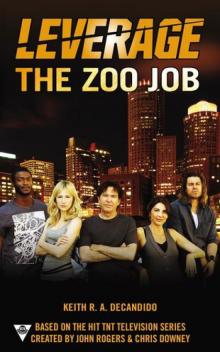 The Zoo Job
The Zoo Job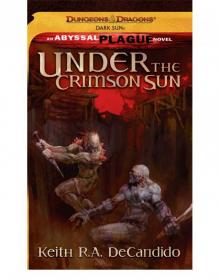 Under the Crimson Sun
Under the Crimson Sun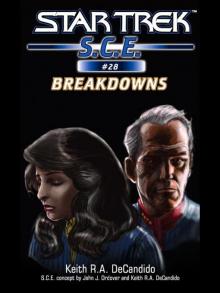 Breakdowns
Breakdowns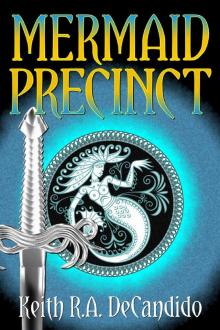 Mermaid Precinct (ARC)
Mermaid Precinct (ARC)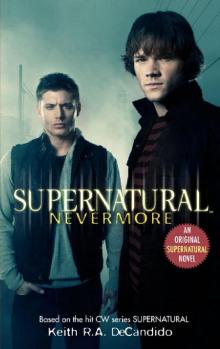 Supernatural 1 - Nevermore
Supernatural 1 - Nevermore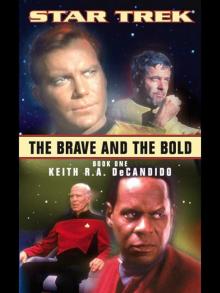 STAR TREK - The Brave and the Bold Book One
STAR TREK - The Brave and the Bold Book One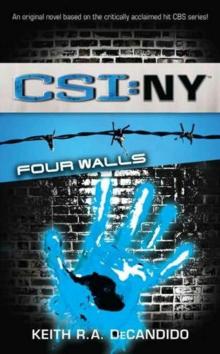 Four Walls
Four Walls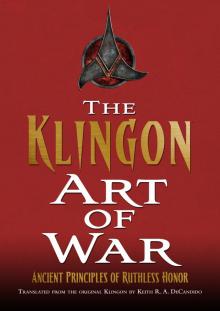 The Klingon Art of War
The Klingon Art of War Blackout
Blackout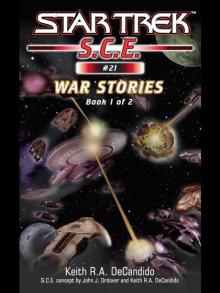 War Stories: Book One
War Stories: Book One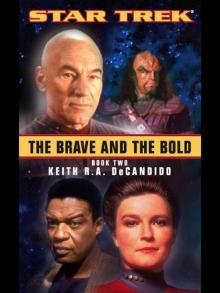 The Brave and the Bold Book Two
The Brave and the Bold Book Two Honor Bound
Honor Bound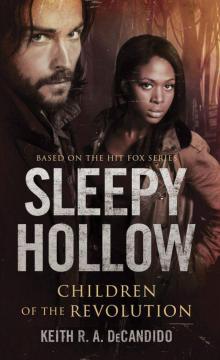 Sleepy Hollow: Children of the Revolution
Sleepy Hollow: Children of the Revolution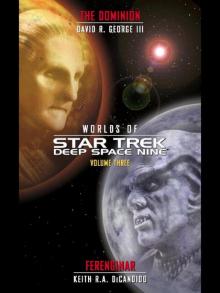 Worlds of Star Trek Deep Space Nine® Volume Three
Worlds of Star Trek Deep Space Nine® Volume Three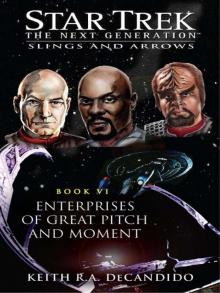 Star Trek: TNG: Enterprises of Great Pitch and Moment
Star Trek: TNG: Enterprises of Great Pitch and Moment Genesis
Genesis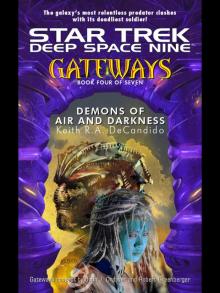 Demons of Air and Darkness
Demons of Air and Darkness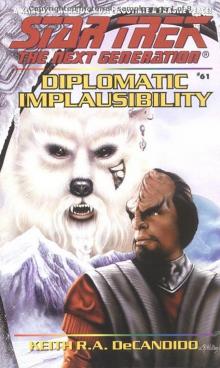 Star Trek - TNG - 61 - Diplomatic Implausibility
Star Trek - TNG - 61 - Diplomatic Implausibility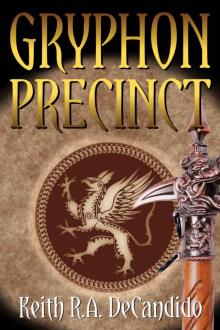 Gryphon Precinct (Dragon Precinct)
Gryphon Precinct (Dragon Precinct)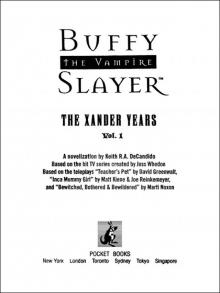 THE XANDER YEARS, Vol. 1
THE XANDER YEARS, Vol. 1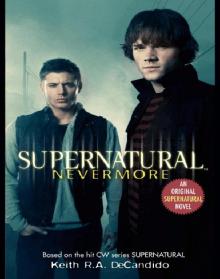 Nevermore
Nevermore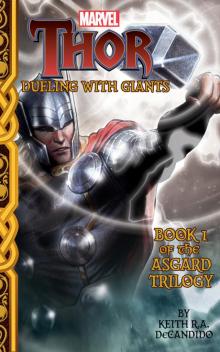 Thor
Thor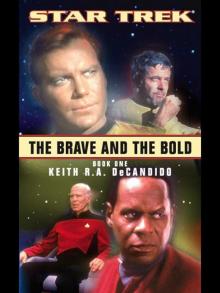 The Brave And The Bold Book One
The Brave And The Bold Book One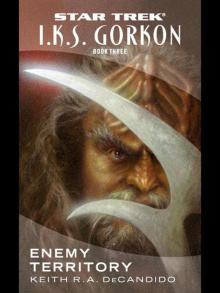 I.K.S. Gorkon Book Three
I.K.S. Gorkon Book Three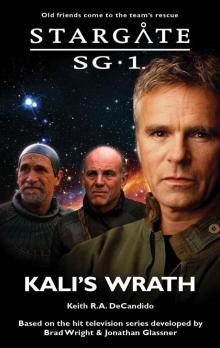 STARGATE SG-1: Kali's Wrath (SG1-28)
STARGATE SG-1: Kali's Wrath (SG1-28)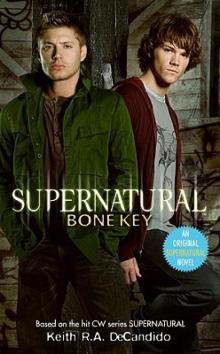 Bone Key
Bone Key Guilt in Innocece
Guilt in Innocece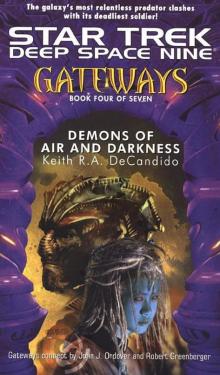 Star Trek - DS9 Relaunch 04 - Gateways - 4 of 7 - Demons Of Air And Darkness
Star Trek - DS9 Relaunch 04 - Gateways - 4 of 7 - Demons Of Air And Darkness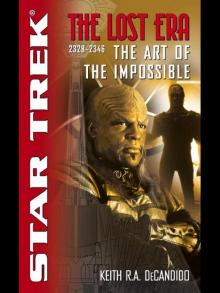 The Art of the Impossible
The Art of the Impossible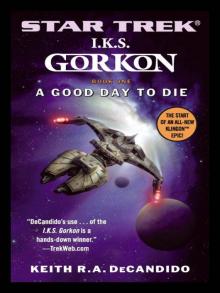 I.K.S. Gorkon Book One: A Good Day to Die
I.K.S. Gorkon Book One: A Good Day to Die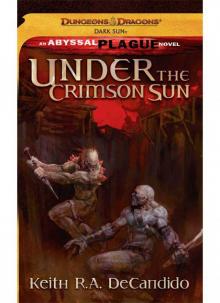 Under the Crimson Sun (the abyssal plague)
Under the Crimson Sun (the abyssal plague)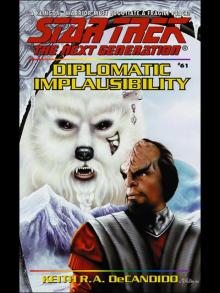 DIPLOMATIC IMPLAUSIBILITY
DIPLOMATIC IMPLAUSIBILITY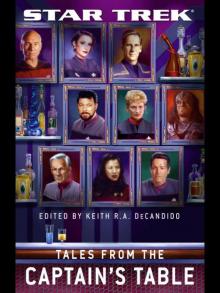 Tales from the Captain's Table
Tales from the Captain's Table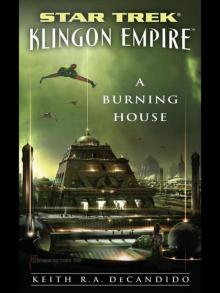 A Burning House
A Burning House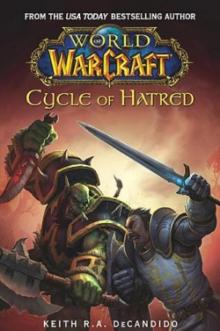 Cycle of Hatred (world of warcraft)
Cycle of Hatred (world of warcraft)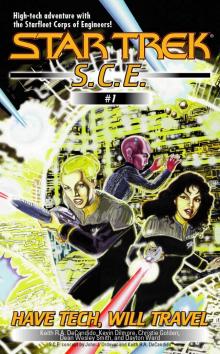 Have Tech, Will Travel
Have Tech, Will Travel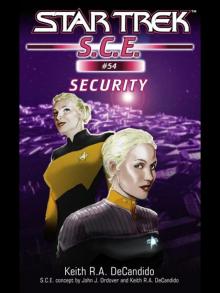 Security
Security